
pebble
A secure and open protocol for decentralized agent-to-agent communication. Built for speed, scale, extensibility and the AI-native internet. 🐧🚀✨
Stars: 100
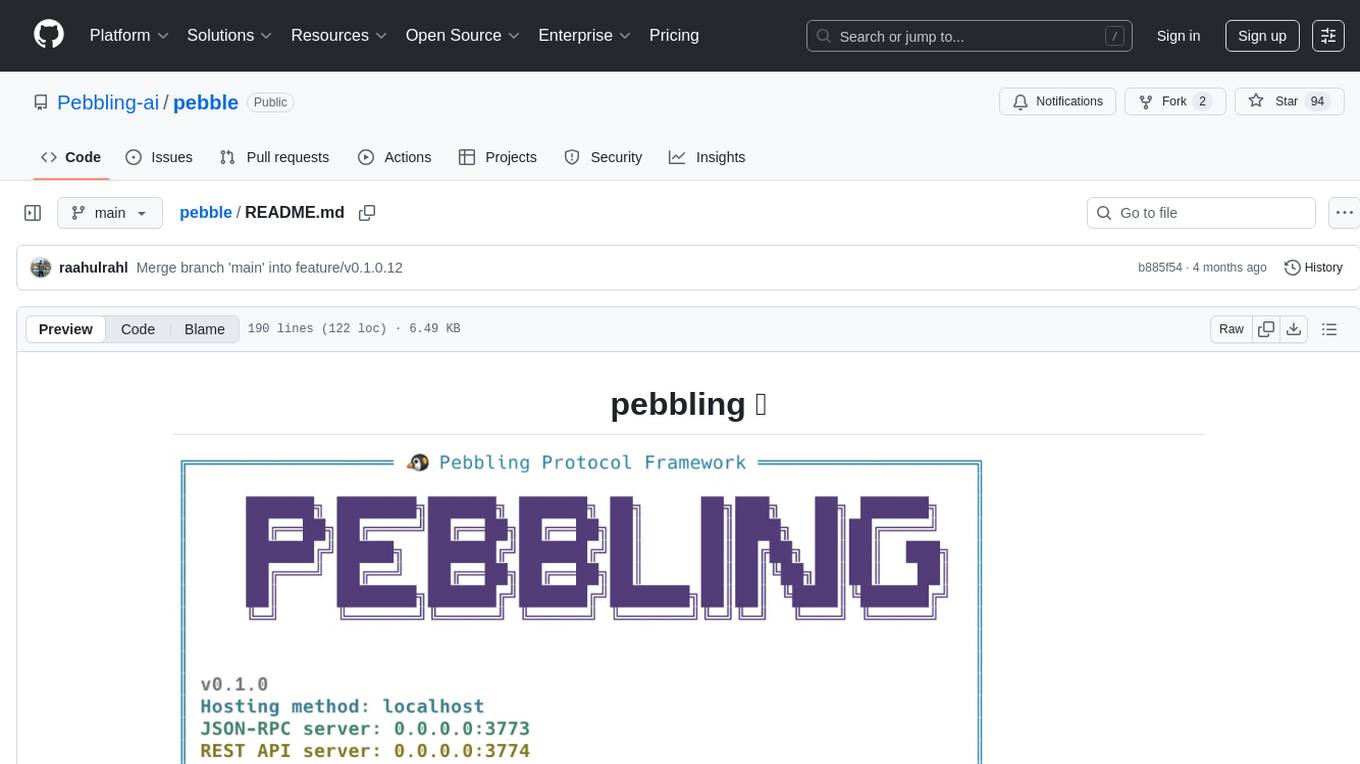
Pebbling is an open-source protocol for agent-to-agent communication, enabling AI agents to collaborate securely using Decentralised Identifiers (DIDs) and mutual TLS (mTLS). It provides a lightweight communication protocol built on JSON-RPC 2.0, ensuring reliable and secure conversations between agents. Pebbling allows agents to exchange messages safely, connect seamlessly regardless of programming language, and communicate quickly and efficiently. It is designed to pave the way for the next generation of collaborative AI systems, promoting secure and effortless communication between agents across different environments.
README:
✨ Imagine a world where AI agents collaborate effortlessly and securely—no passport 🚫, no boundaries 🌐.
That’s Pebbling 🐧.An open source, secured protocol for agent-to-agent communication.
🚀 Powered by Decentralised Identifiers (DIDs) 🔑, secured conversations with mutual TLS (mTLS) 🔒, and a lightweight yet powerful communication protocol built on JSON-RPC 2.0 ⚡️—Pebbling is paving the way for the next generation of collaborative AI systems. 🌟🤖
Pebbling helps your AI agents talk to each other seamlessly:
🔒 Super Secure - Your agents exchange secrets safely (with built-in mTLS)
🧩 Plug-and-Play - Just decorate your agent and it's ready to communicate
⚡ Lightning Fast - Quick connections without the weight
🌐 Works Everywhere - Connect any agents, regardless of their programming language
🔄 Reliable Communication - Messages always arrive correctly and in order
# Using pip
pip install pebbling
# Using uv (recommended)
uv add pebblingThe fastest way to get started with Pebbling is using our cookiecutter template:
# Create a new Pebbling project
uv tool run cookiecutter cookiecutter-pebbling/Follow the interactive prompts:
[1/4] name (pebble_project): my_weather_agent
[2/4] description (): A weather forecasting agent
[3/4] pebbling_email (): [email protected]
[4/4] Select agent_framework
1 - none
2 - agno
3 - crew
4 - langchain
Choose from [1/2/3/4] (1): 2
After project creation:
🎉 Project created successfully!
🐧 Welcome to Pebbling — powered by the Pebble CLI.
Next steps:
1️⃣ cd 'my_weather_agent'
2️⃣ Set it up using uv: 📦
uv sync
3️⃣ Run your agent locally: 💻
PYTHONPATH=src python3 -m my_weather_agent
or
python3 src/<filename.py>
4️⃣ Deploy your agent: 🚀
pebble launch
🤖 Selected agent framework: agno
Need help? See README.md for details. ✨Setup and run your agent:
# Navigate to your project
cd my_weather_agent
# Create virtual environment
uv venv --python 3.12.9
source .venv/bin/activate
# Install dependencies
uv sync
# Run your agent
uv run src/pebble_agent.pyYour agent will start with full Pebbling capabilities:
- ✅ Automatic DID identity generation
- ✅ Security setup with mTLS certificates
- ✅ Agent manifest creation
- ✅ Local server running on http://localhost:8030
- ✅ OpenInference observability integration
📂 Template Repository: cookiecutter-pebbling
from pebbling import pebblify
@pebblify(name="My Agent", description="A simple agent", version="1.0.0")
def my_agent(message: str) -> str:
return "Hello, Agent!"
# You're now ready to communicate securely between agents!Pebblify a Agno Agent
from pebbling import pebblify
from agno.agent import Agent
from agno.models.openai import OpenAIChat
@pebblify(name="Agno Agent", description="A helpful assistant", version="1.0.0")
def agno_agent(message: str) -> str:
agent = Agent(
model=OpenAIChat(id="gpt-4o"),
instructions="You are a helpful assistant.",
)
result = agent.run(message)
return result.to_dict()["content"]
# You're now ready to communicate securely between agents!|
Open the interactive version of this sequence diagram in MermaidChart |
Open the interactive version of this orchestration diagram in MermaidChart |
Pebbling is tested and integrated with popular agent frameworks:
- ✅ Agno
- 🔜 CrewAI (Coming soon)
- 🔜 AutoGen (Coming soon)
- 🔜 LangChain (Coming soon)
- 🔜 LlamaIndex (Coming soon)
Want integration with your favorite framework? Let us know on Discord!
For comprehensive documentation, visit docs.pebbling.ai
Pebbling is thoroughly tested with a test coverage of over 83%:
# Run tests with coverage
make test
make coverageWe welcome contributions! Here's how to get started:
# Clone the repository
git clone https://github.com/Pebbling-ai/pebble.git
cd pebble
# Install development dependencies
uv sync --dev
# Install pre-commit hooks
pre-commit install
# Run tests
make testPlease see our Contributing Guidelines for more details.
For more details about maintainership, including how to become a maintainer, see our MAINTAINERS.md file.
Pebbling is proudly open-source and licensed under the MIT License.
Pebbling is ideal for:
- Multi-Agent Collaboration: Enable efficient, secure teamwork between LLM-driven agents.
- Decentralized Autonomous Systems: Build reliable decentralized AI networks.
- Secure Agent Ecosystems: Create ecosystems where agents from different providers interact seamlessly.
- Distributed AI Workflows: Coordinate agents across distributed computing environments.
We 💛 contributions! Whether you're fixing bugs, improving documentation, or building demos — your contributions make Pebbling better.
- Join our Discord for discussions and support
- Star the repository if you find it useful!
Here's what's next for pebbling:
- [ ] GRPC transport support
- [ ] Integration with Hibiscus (DiD - Decentralized Identifiers, mTLS)
- [ ] Detailed tutorials and guides
- [ ] Expanded multi-framework support
Suggest features or contribute by joining our Discord!
Can Pebble be deployed locally? Yes! Pebble supports local development as well as cloud-based deployments.
Does Pebble support other languages besides Python? Absolutely! Any language that can implement JSON-RPC and mTLS is compatible.
How scalable is Pebble? Pebble's minimal dependencies and protocol simplicity ensure scalability across complex agent ecosystems.
Built with ❤️ by the Pebbling team from Amsterdam 🌷.
We’re excited to see what you’ll build with Pebble! Our dream is a world where agents across the internet communicate securely, openly, and effortlessly.
Have questions, ideas, or just want to chat? Join our Discord community— we’d love to hear from you! Together, let’s lay the foundation for the next generation of AI agent collaboration.
Happy Pebbling! 🐧🚀✨
For Tasks:
Click tags to check more tools for each tasksFor Jobs:
Alternative AI tools for pebble
Similar Open Source Tools

pebble
Pebbling is an open-source protocol for agent-to-agent communication, enabling AI agents to collaborate securely using Decentralised Identifiers (DIDs) and mutual TLS (mTLS). It provides a lightweight communication protocol built on JSON-RPC 2.0, ensuring reliable and secure conversations between agents. Pebbling allows agents to exchange messages safely, connect seamlessly regardless of programming language, and communicate quickly and efficiently. It is designed to pave the way for the next generation of collaborative AI systems, promoting secure and effortless communication between agents across different environments.
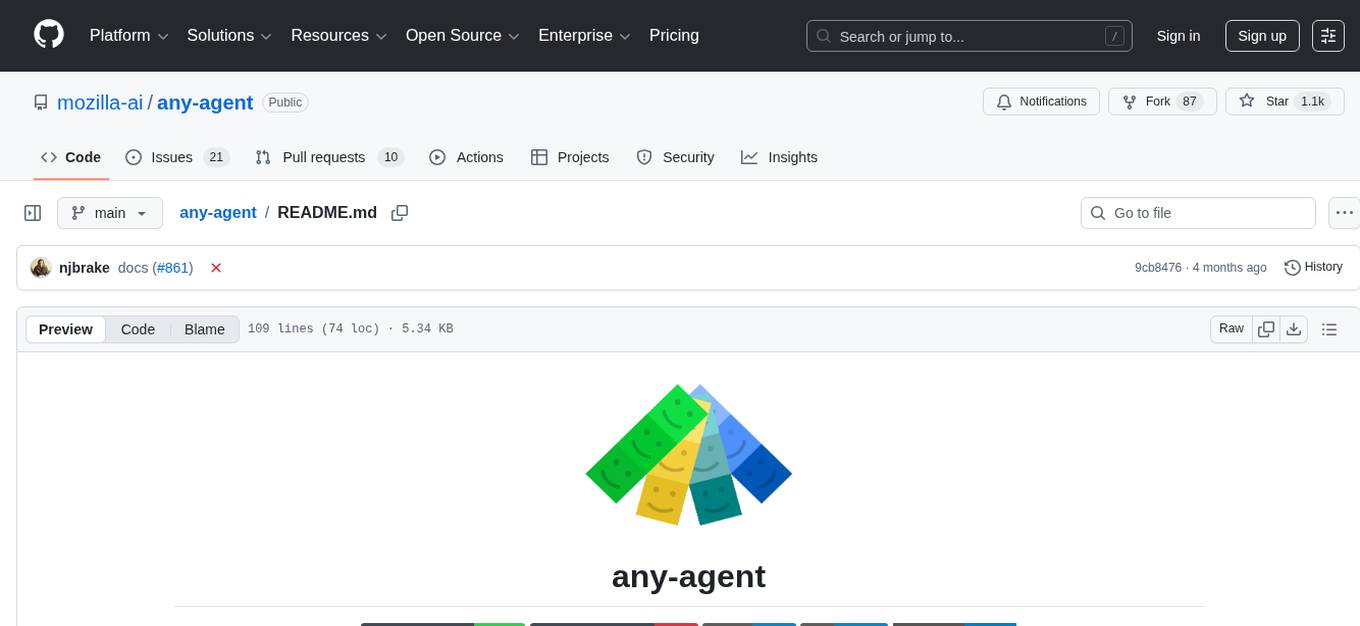
any-agent
Any-agent is a tool that provides a single interface to use and evaluate different agent frameworks. It supports various frameworks like TinyAgent, Google ADK, LangChain, LlamaIndex, OpenAI Agents, Smolagents, and Agno AI. Users can define agent systems using the tool and access practical examples for creating agents, agent evaluations, using callbacks, integrating Model Context Protocol tools, deploying agents with Agent-to-Agent communication, and building Multi-Agent Systems with A2A. Contributions for new frameworks and features are welcome.
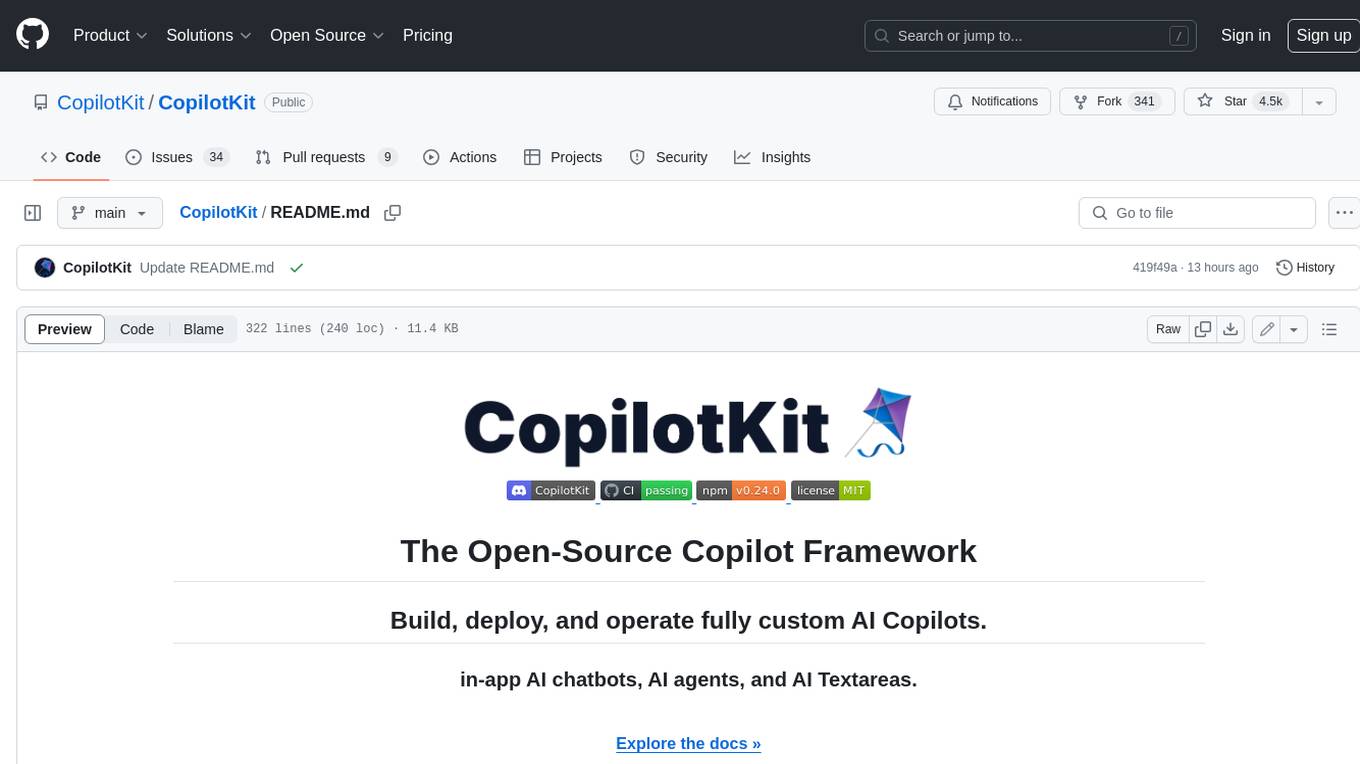
CopilotKit
CopilotKit is an open-source framework for building, deploying, and operating fully custom AI Copilots, including in-app AI chatbots, AI agents, and AI Textareas. It provides a set of components and entry points that allow developers to easily integrate AI capabilities into their applications. CopilotKit is designed to be flexible and extensible, so developers can tailor it to their specific needs. It supports a variety of use cases, including providing app-aware AI chatbots that can interact with the application state and take action, drop-in replacements for textareas with AI-assisted text generation, and in-app agents that can access real-time application context and take action within the application.
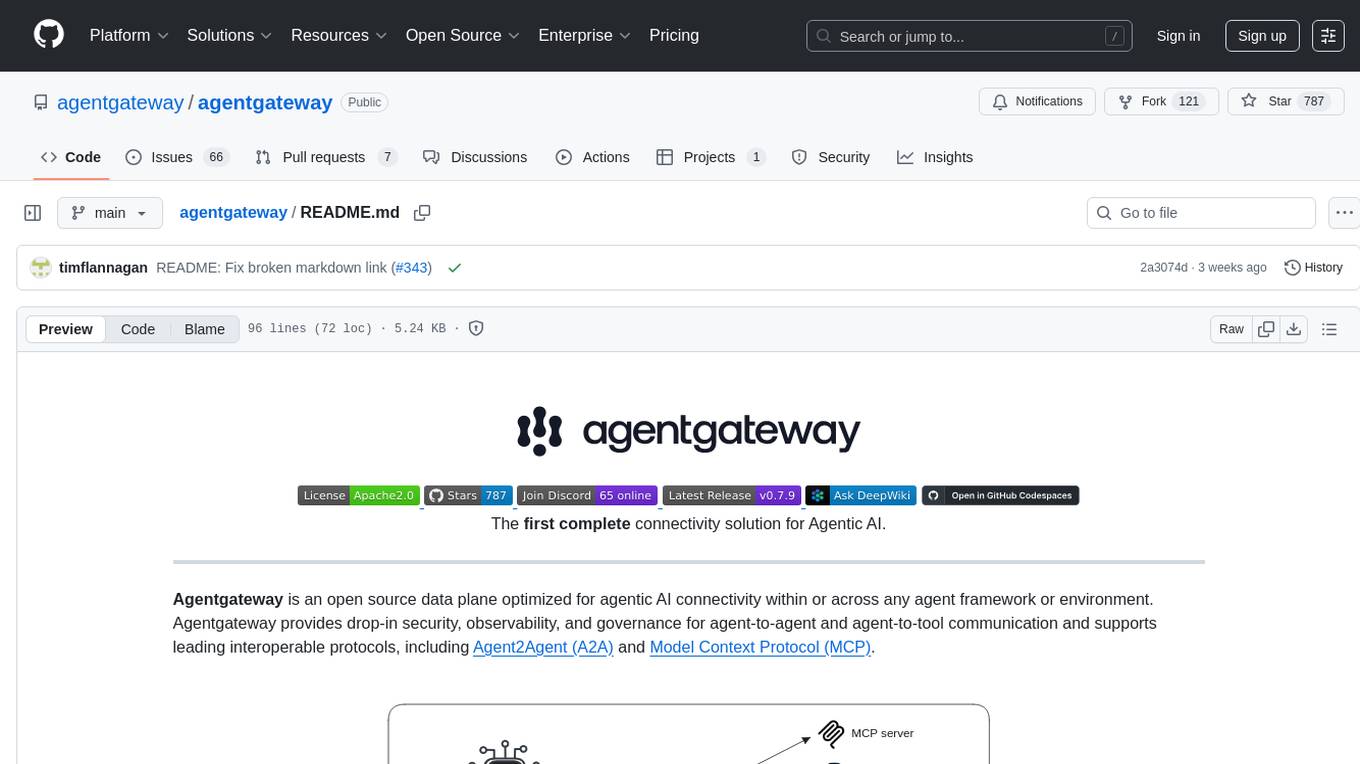
agentgateway
Agentgateway is an open source data plane optimized for agentic AI connectivity within or across any agent framework or environment. It provides drop-in security, observability, and governance for agent-to-agent and agent-to-tool communication, supporting leading interoperable protocols like Agent2Agent (A2A) and Model Context Protocol (MCP). Highly performant, security-first, multi-tenant, dynamic, and supporting legacy API transformation, agentgateway is designed to handle any scale and run anywhere with any agent framework.
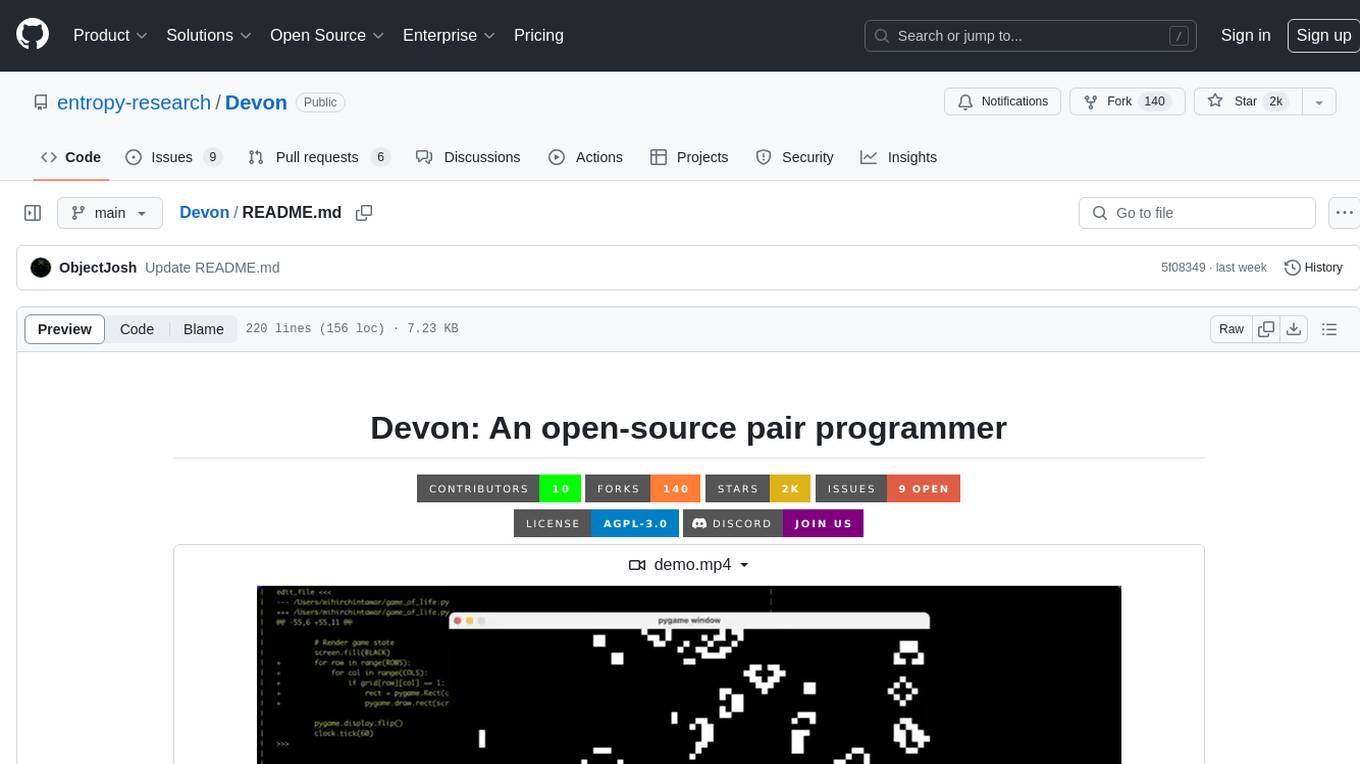
Devon
Devon is an open-source pair programmer tool designed to facilitate collaborative coding sessions. It provides features such as multi-file editing, codebase exploration, test writing, bug fixing, and architecture exploration. The tool supports Anthropic, OpenAI, and Groq APIs, with plans to add more models in the future. Devon is community-driven, with ongoing development goals including multi-model support, plugin system for tool builders, self-hostable Electron app, and setting SOTA on SWE-bench Lite. Users can contribute to the project by developing core functionality, conducting research on agent performance, providing feedback, and testing the tool.

anything-llm
AnythingLLM is a full-stack application that enables you to turn any document, resource, or piece of content into context that any LLM can use as references during chatting. This application allows you to pick and choose which LLM or Vector Database you want to use as well as supporting multi-user management and permissions.
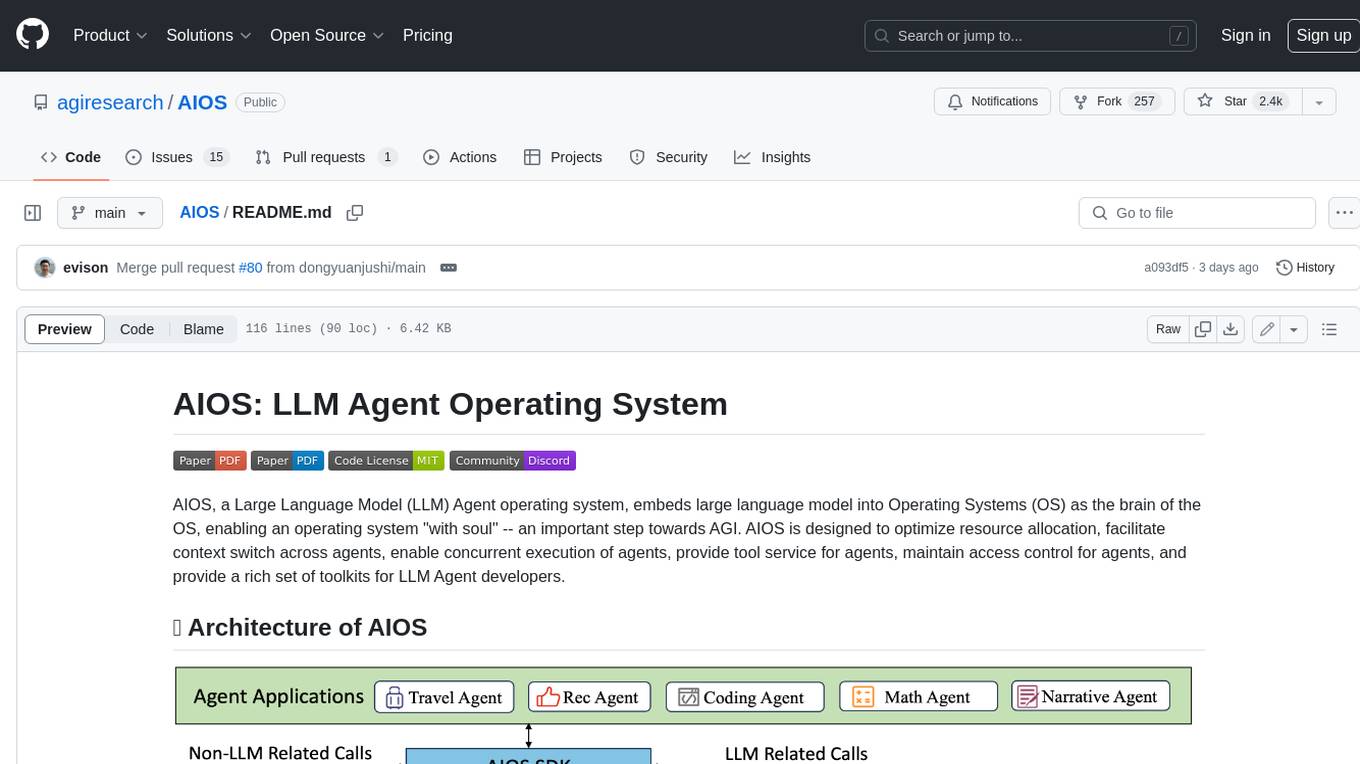
AIOS
AIOS, a Large Language Model (LLM) Agent operating system, embeds large language model into Operating Systems (OS) as the brain of the OS, enabling an operating system "with soul" -- an important step towards AGI. AIOS is designed to optimize resource allocation, facilitate context switch across agents, enable concurrent execution of agents, provide tool service for agents, maintain access control for agents, and provide a rich set of toolkits for LLM Agent developers.
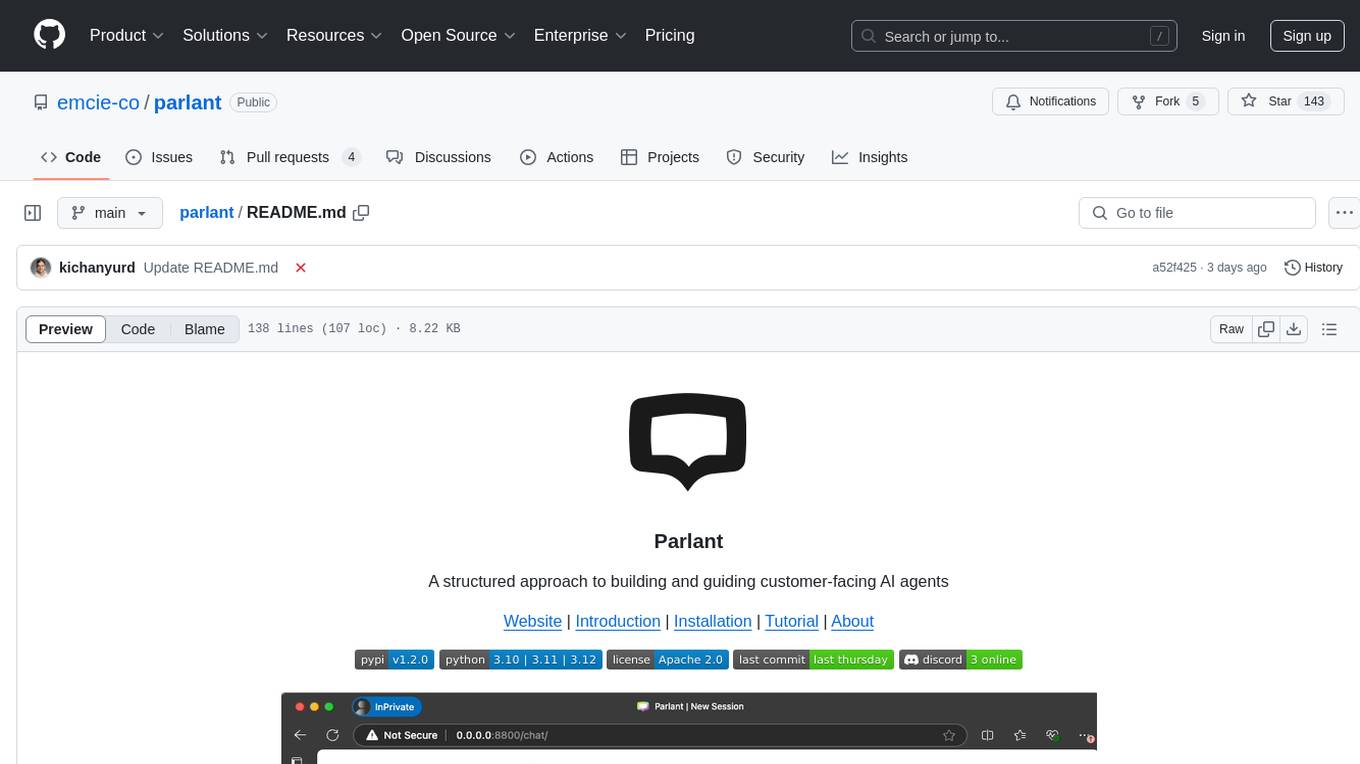
parlant
Parlant is a structured approach to building and guiding customer-facing AI agents. It allows developers to create and manage robust AI agents, providing specific feedback on agent behavior and helping understand user intentions better. With features like guidelines, glossary, coherence checks, dynamic context, and guided tool use, Parlant offers control over agent responses and behavior. Developer-friendly aspects include instant changes, Git integration, clean architecture, and type safety. It enables confident deployment with scalability, effective debugging, and validation before deployment. Parlant works with major LLM providers and offers client SDKs for Python and TypeScript. The tool facilitates natural customer interactions through asynchronous communication and provides a chat UI for testing new behaviors before deployment.
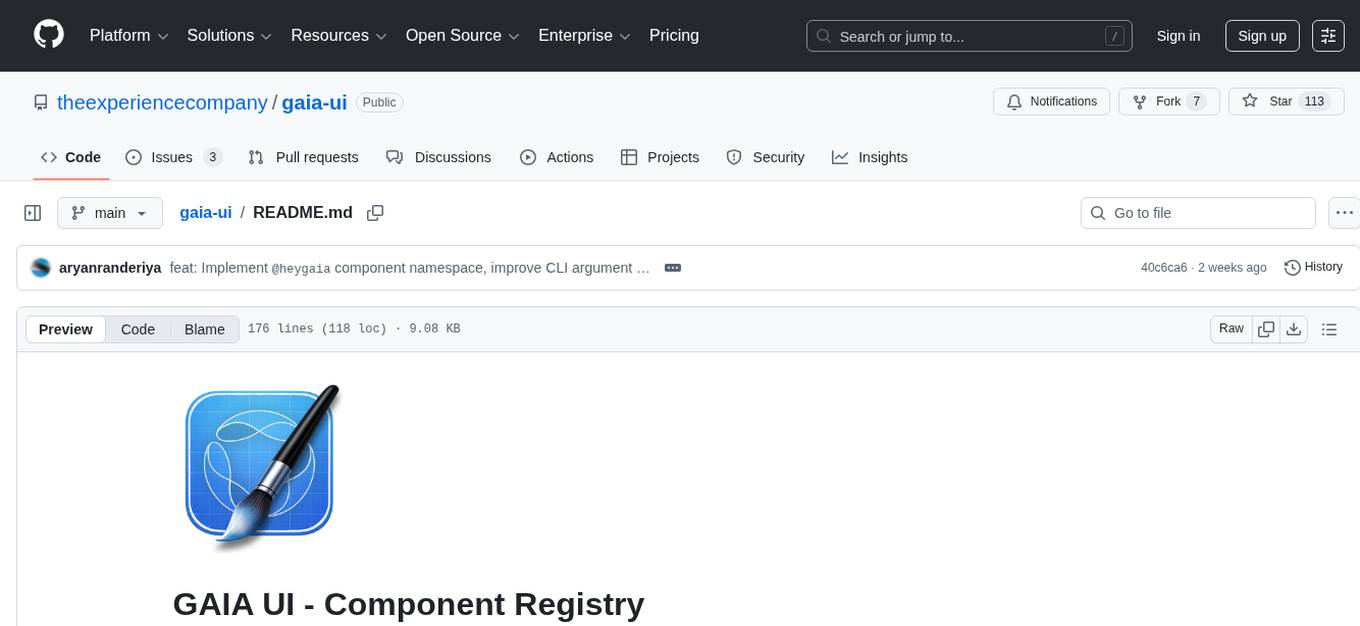
gaia-ui
A collection of production-ready UI components designed specifically for building AI assistants and chatbots. These components are battle-tested in production at GAIA, designed to handle edge cases and real-world scenarios, accessible, responsive, and performant. The library focuses on quality over quantity, offering components that solve real problems better than existing alternatives. Users can easily add components to their projects using the provided commands, and the library is actively being developed and refined for better compatibility and smaller bundle sizes.
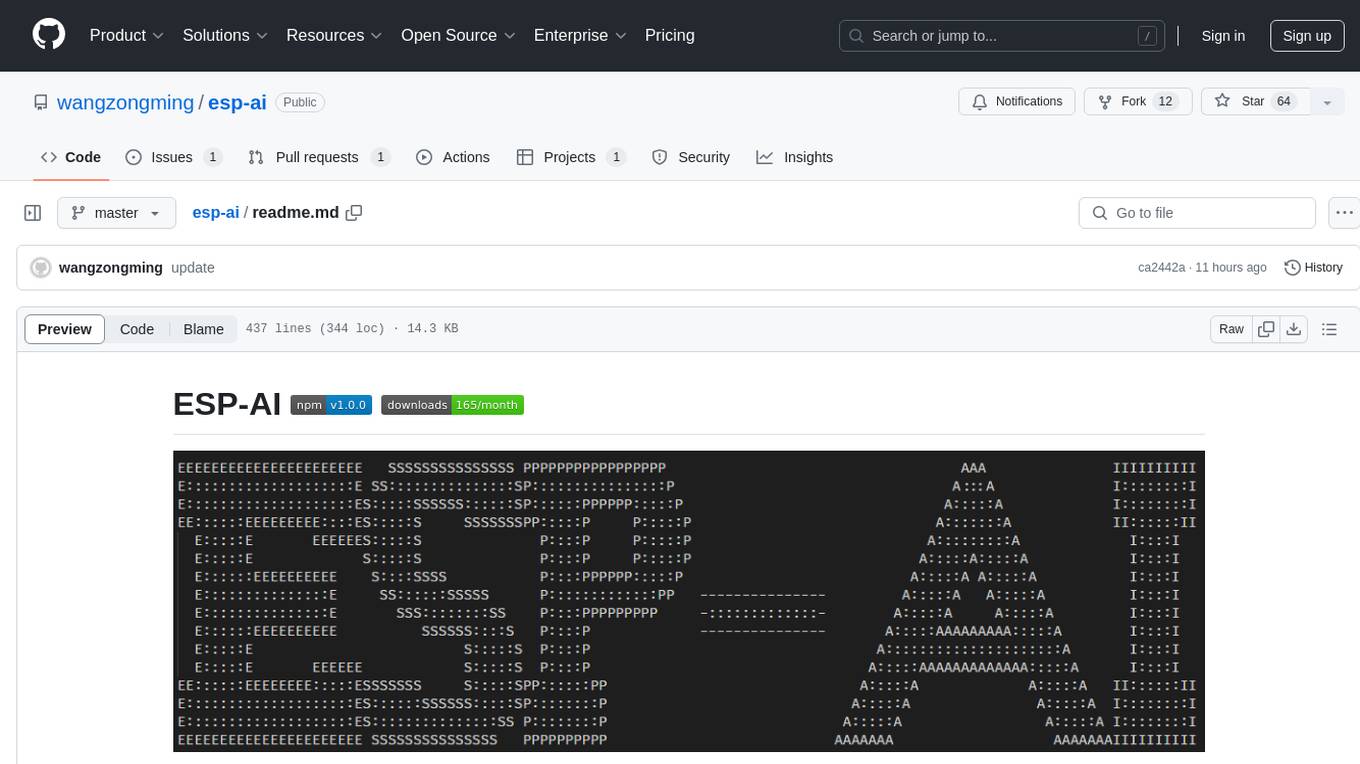
esp-ai
ESP-AI provides a complete AI conversation solution for your development board, including IAT+LLM+TTS integration solutions for ESP32 series development boards. It can be injected into projects without affecting existing ones. By providing keys from platforms like iFlytek, Jiling, and local services, you can run the services without worrying about interactions between services or between development boards and services. The project's server-side code is based on Node.js, and the hardware code is based on Arduino IDE.

glide
Glide is a cloud-native LLM gateway that provides a unified REST API for accessing various large language models (LLMs) from different providers. It handles LLMOps tasks such as model failover, caching, key management, and more, making it easy to integrate LLMs into applications. Glide supports popular LLM providers like OpenAI, Anthropic, Azure OpenAI, AWS Bedrock (Titan), Cohere, Google Gemini, OctoML, and Ollama. It offers high availability, performance, and observability, and provides SDKs for Python and NodeJS to simplify integration.
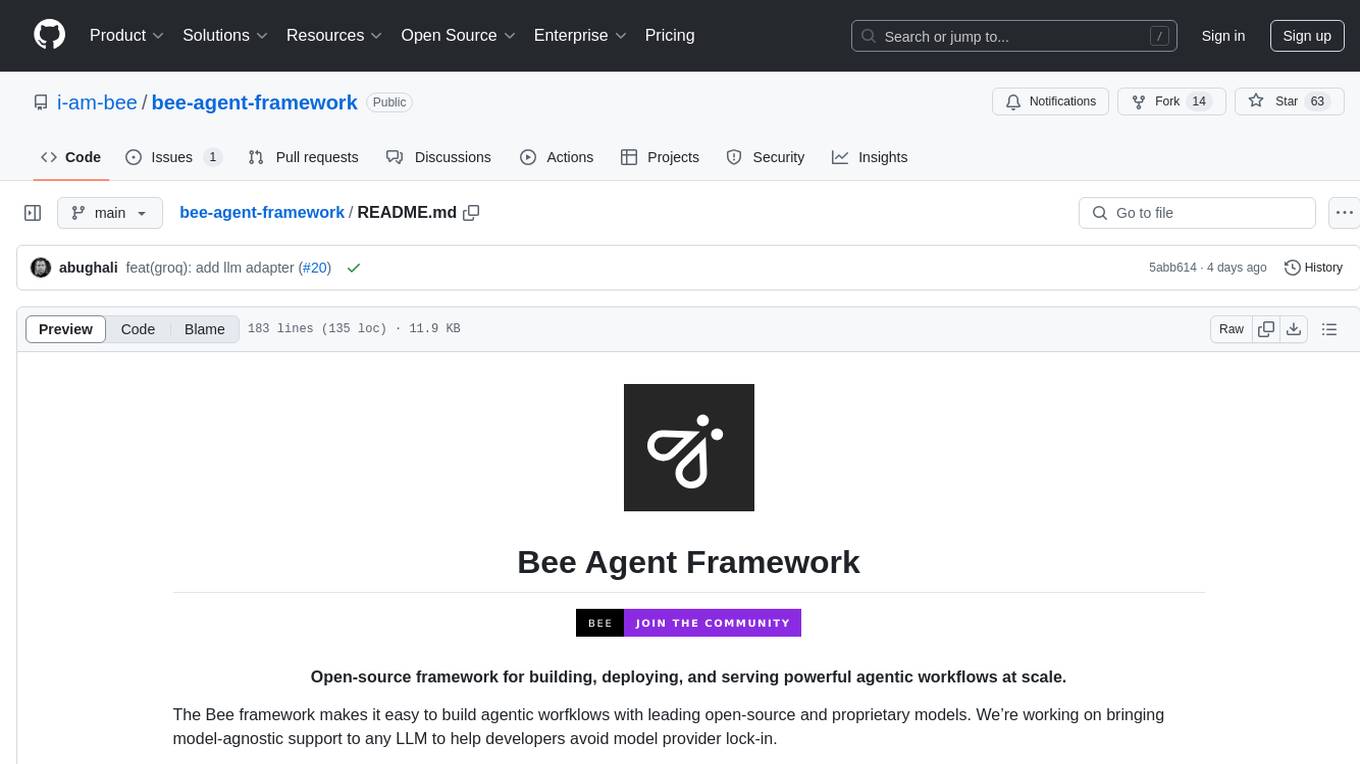
bee-agent-framework
The Bee Agent Framework is an open-source tool for building, deploying, and serving powerful agentic workflows at scale. It provides AI agents, tools for creating workflows in Javascript/Python, a code interpreter, memory optimization strategies, serialization for pausing/resuming workflows, traceability features, production-level control, and upcoming features like model-agnostic support and a chat UI. The framework offers various modules for agents, llms, memory, tools, caching, errors, adapters, logging, serialization, and more, with a roadmap including MLFlow integration, JSON support, structured outputs, chat client, base agent improvements, guardrails, and evaluation.

mlflow
MLflow is a platform to streamline machine learning development, including tracking experiments, packaging code into reproducible runs, and sharing and deploying models. MLflow offers a set of lightweight APIs that can be used with any existing machine learning application or library (TensorFlow, PyTorch, XGBoost, etc), wherever you currently run ML code (e.g. in notebooks, standalone applications or the cloud). MLflow's current components are:
* `MLflow Tracking

cognee
Cognee is an open-source framework designed for creating self-improving deterministic outputs for Large Language Models (LLMs) using graphs, LLMs, and vector retrieval. It provides a platform for AI engineers to enhance their models and generate more accurate results. Users can leverage Cognee to add new information, utilize LLMs for knowledge creation, and query the system for relevant knowledge. The tool supports various LLM providers and offers flexibility in adding different data types, such as text files or directories. Cognee aims to streamline the process of working with LLMs and improving AI models for better performance and efficiency.
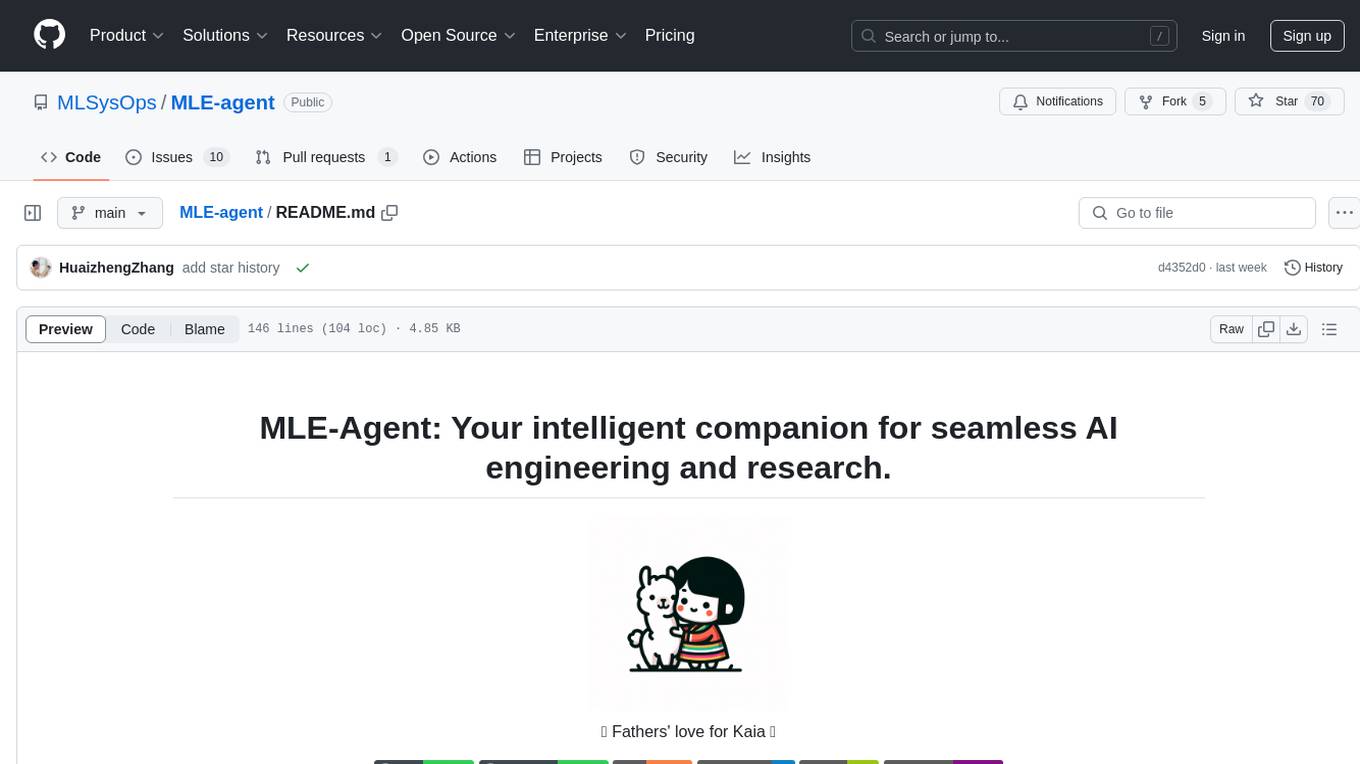
MLE-agent
MLE-Agent is an intelligent companion designed for machine learning engineers and researchers. It features autonomous baseline creation, integration with Arxiv and Papers with Code, smart debugging, file system organization, comprehensive tools integration, and an interactive CLI chat interface for seamless AI engineering and research workflows.
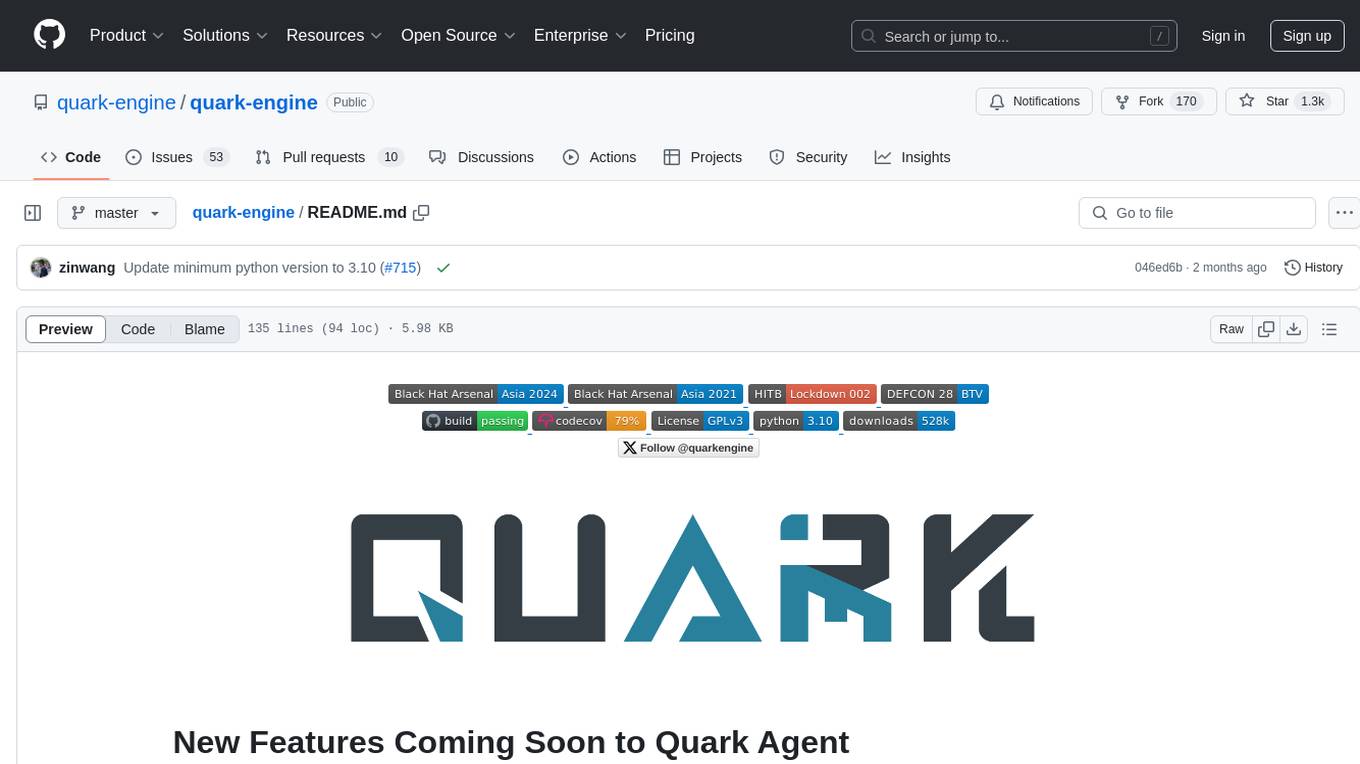
quark-engine
Quark Engine is an AI-powered tool designed for analyzing Android APK files. It focuses on enhancing the detection process for auto-suggestion, enabling users to create detection workflows without coding. The tool offers an intuitive drag-and-drop interface for workflow adjustments and updates. Quark Agent, the core component, generates Quark Script code based on natural language input and feedback. The project is committed to providing a user-friendly experience for designing detection workflows through textual and visual methods. Various features are still under development and will be rolled out gradually.
For similar tasks

pebble
Pebbling is an open-source protocol for agent-to-agent communication, enabling AI agents to collaborate securely using Decentralised Identifiers (DIDs) and mutual TLS (mTLS). It provides a lightweight communication protocol built on JSON-RPC 2.0, ensuring reliable and secure conversations between agents. Pebbling allows agents to exchange messages safely, connect seamlessly regardless of programming language, and communicate quickly and efficiently. It is designed to pave the way for the next generation of collaborative AI systems, promoting secure and effortless communication between agents across different environments.
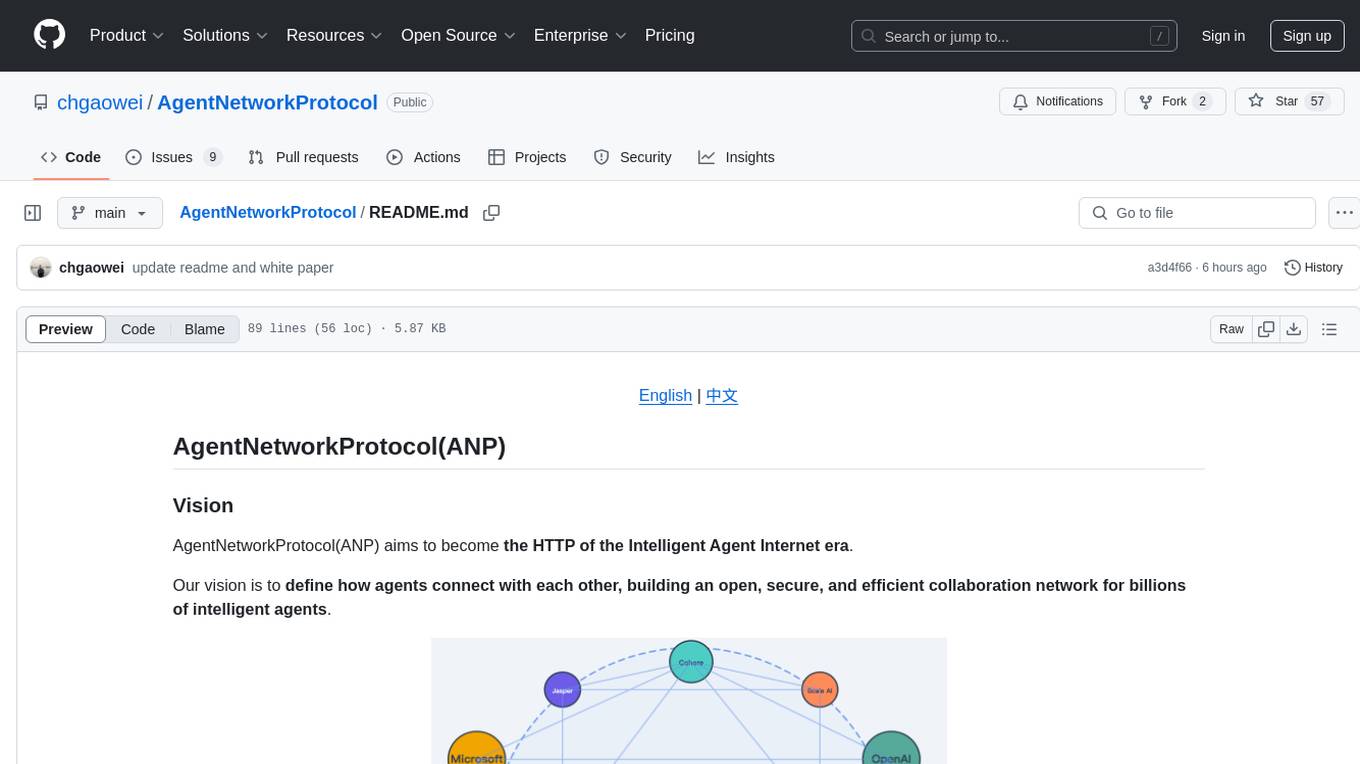
AgentNetworkProtocol
AgentNetworkProtocol (ANP) aims to define how agents connect with each other, building an open, secure, and efficient collaboration network for billions of intelligent agents. It addresses challenges in interconnectivity, native interfaces, and efficient collaboration by providing protocol layers for identity and encrypted communication, meta-protocol negotiation, and application protocol management. The project is developing an open-source implementation available on GitHub, with a vision to become the HTTP of the Intelligent Agent Internet era and establish ANP as an industry standard through a standardization committee. Contact the author Gaowei Chang via email, Discord, website, or GitHub for contributions or inquiries.

agentgateway
Agentgateway is an open source data plane optimized for agentic AI connectivity within or across any agent framework or environment. It provides drop-in security, observability, and governance for agent-to-agent and agent-to-tool communication, supporting leading interoperable protocols like Agent2Agent (A2A) and Model Context Protocol (MCP). Highly performant, security-first, multi-tenant, dynamic, and supporting legacy API transformation, agentgateway is designed to handle any scale and run anywhere with any agent framework.
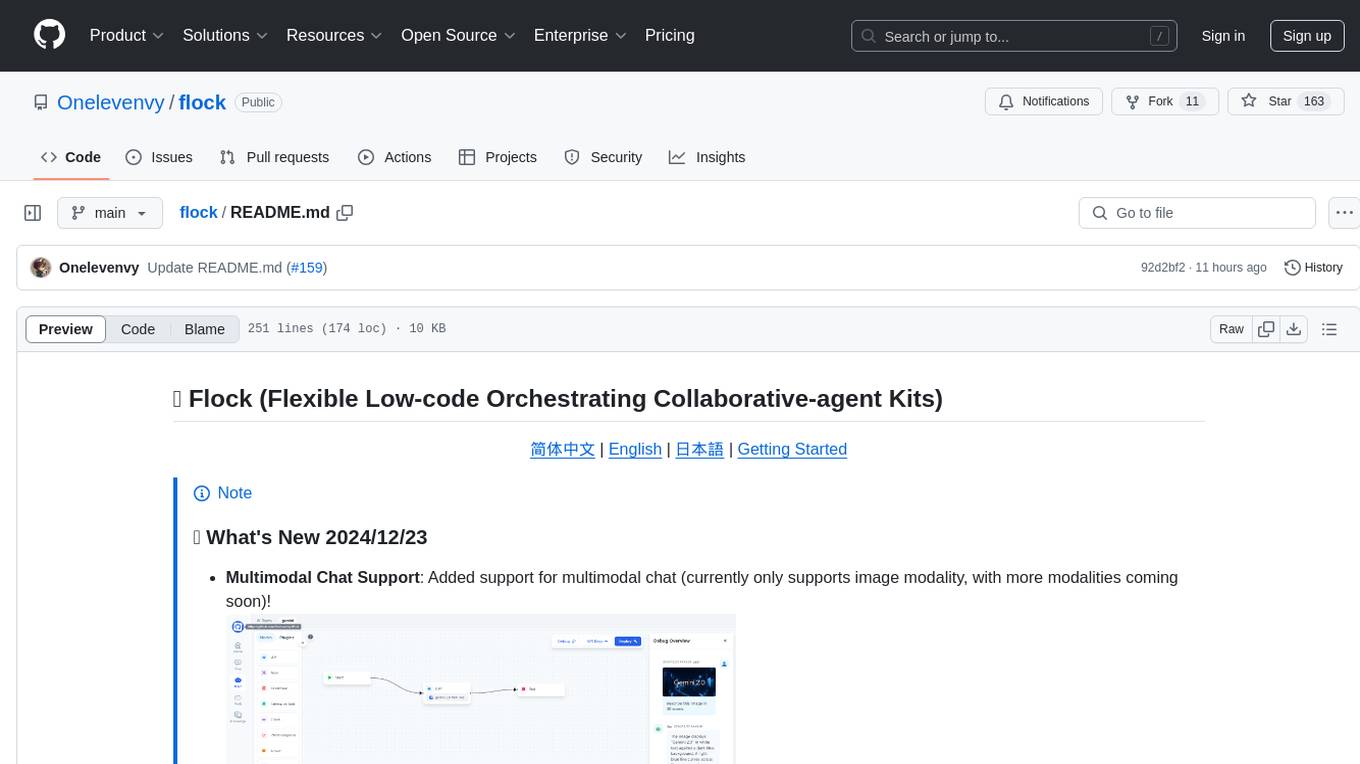
flock
Flock is a workflow-based low-code platform that enables rapid development of chatbots, RAG applications, and coordination of multi-agent teams. It offers a flexible, low-code solution for orchestrating collaborative agents, supporting various node types for specific tasks, such as input processing, text generation, knowledge retrieval, tool execution, intent recognition, answer generation, and more. Flock integrates LangChain and LangGraph to provide offline operation capabilities and supports future nodes like Conditional Branch, File Upload, and Parameter Extraction for creating complex workflows. Inspired by StreetLamb, Lobe-chat, Dify, and fastgpt projects, Flock introduces new features and directions while leveraging open-source models and multi-tenancy support.
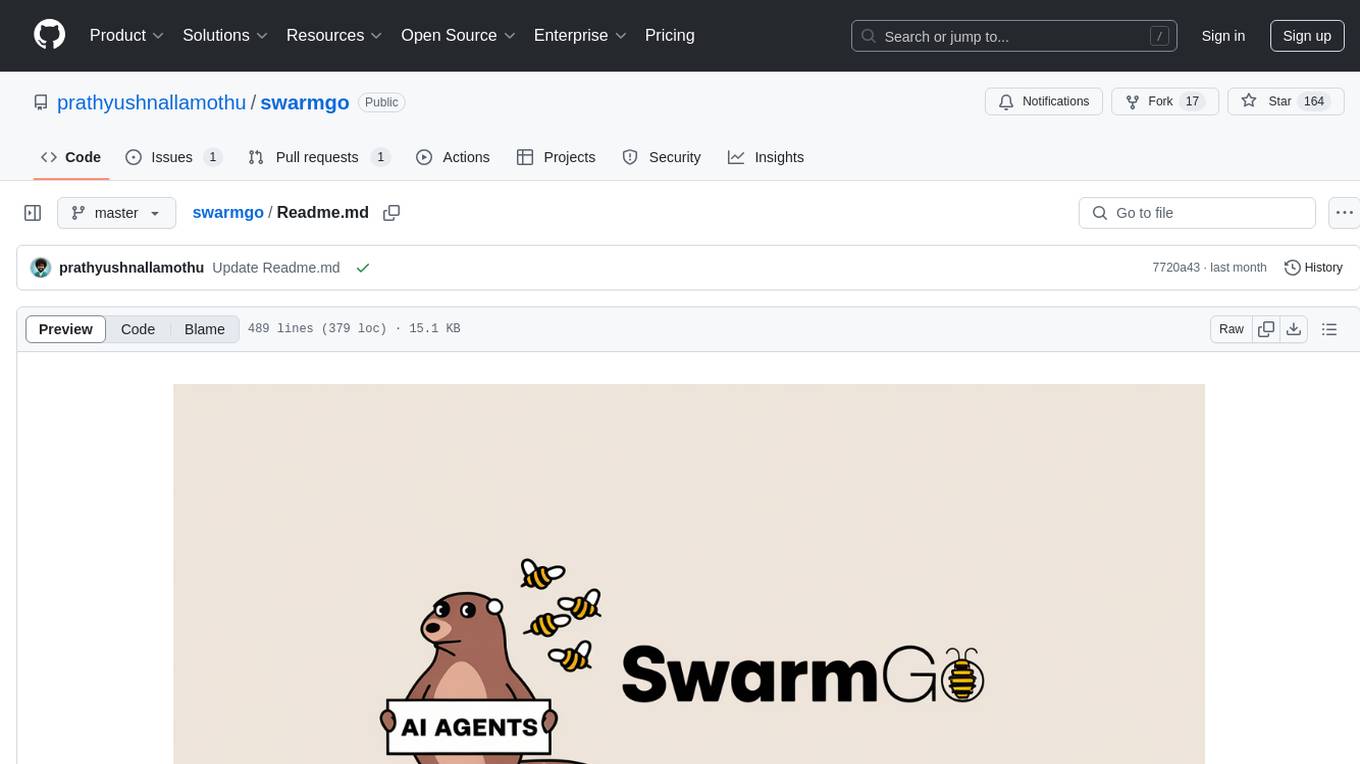
swarmgo
SwarmGo is a Go package designed to create AI agents capable of interacting, coordinating, and executing tasks. It focuses on lightweight agent coordination and execution, offering powerful primitives like Agents and handoffs. SwarmGo enables building scalable solutions with rich dynamics between tools and networks of agents, all while keeping the learning curve low. It supports features like memory management, streaming support, concurrent agent execution, LLM interface, and structured workflows for organizing and coordinating multiple agents.
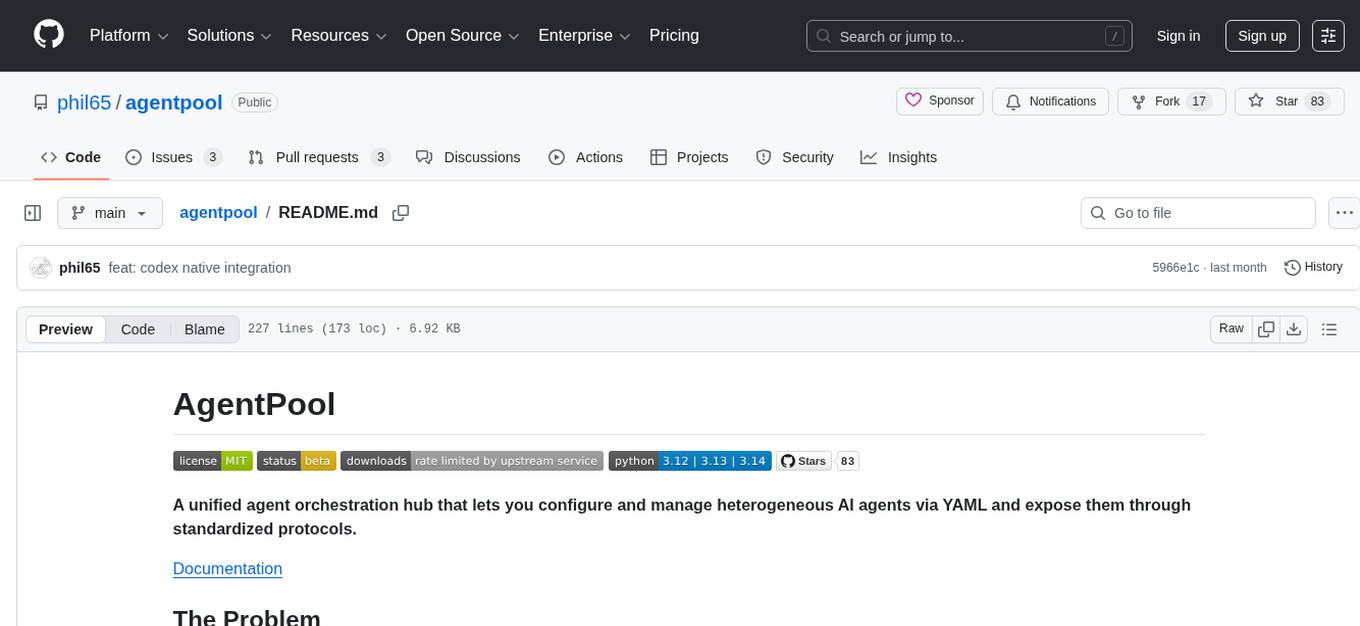
agentpool
AgentPool is a unified agent orchestration hub that allows users to configure and manage heterogeneous AI agents via YAML and expose them through standardized protocols. It acts as a protocol bridge, enabling users to define all agents in one YAML file and expose them through ACP or AG-UI protocols. Users can coordinate, delegate, and communicate with different agents through a unified interface. The tool supports multi-agent coordination, rich YAML configuration, server protocols like ACP and OpenCode, and additional capabilities such as structured output, storage & analytics, file abstraction, triggers, and streaming TTS. It offers CLI and programmatic usage patterns for running agents and interacting with the tool.
For similar jobs

sweep
Sweep is an AI junior developer that turns bugs and feature requests into code changes. It automatically handles developer experience improvements like adding type hints and improving test coverage.

teams-ai
The Teams AI Library is a software development kit (SDK) that helps developers create bots that can interact with Teams and Microsoft 365 applications. It is built on top of the Bot Framework SDK and simplifies the process of developing bots that interact with Teams' artificial intelligence capabilities. The SDK is available for JavaScript/TypeScript, .NET, and Python.

ai-guide
This guide is dedicated to Large Language Models (LLMs) that you can run on your home computer. It assumes your PC is a lower-end, non-gaming setup.

classifai
Supercharge WordPress Content Workflows and Engagement with Artificial Intelligence. Tap into leading cloud-based services like OpenAI, Microsoft Azure AI, Google Gemini and IBM Watson to augment your WordPress-powered websites. Publish content faster while improving SEO performance and increasing audience engagement. ClassifAI integrates Artificial Intelligence and Machine Learning technologies to lighten your workload and eliminate tedious tasks, giving you more time to create original content that matters.

chatbot-ui
Chatbot UI is an open-source AI chat app that allows users to create and deploy their own AI chatbots. It is easy to use and can be customized to fit any need. Chatbot UI is perfect for businesses, developers, and anyone who wants to create a chatbot.

BricksLLM
BricksLLM is a cloud native AI gateway written in Go. Currently, it provides native support for OpenAI, Anthropic, Azure OpenAI and vLLM. BricksLLM aims to provide enterprise level infrastructure that can power any LLM production use cases. Here are some use cases for BricksLLM: * Set LLM usage limits for users on different pricing tiers * Track LLM usage on a per user and per organization basis * Block or redact requests containing PIIs * Improve LLM reliability with failovers, retries and caching * Distribute API keys with rate limits and cost limits for internal development/production use cases * Distribute API keys with rate limits and cost limits for students

uAgents
uAgents is a Python library developed by Fetch.ai that allows for the creation of autonomous AI agents. These agents can perform various tasks on a schedule or take action on various events. uAgents are easy to create and manage, and they are connected to a fast-growing network of other uAgents. They are also secure, with cryptographically secured messages and wallets.

griptape
Griptape is a modular Python framework for building AI-powered applications that securely connect to your enterprise data and APIs. It offers developers the ability to maintain control and flexibility at every step. Griptape's core components include Structures (Agents, Pipelines, and Workflows), Tasks, Tools, Memory (Conversation Memory, Task Memory, and Meta Memory), Drivers (Prompt and Embedding Drivers, Vector Store Drivers, Image Generation Drivers, Image Query Drivers, SQL Drivers, Web Scraper Drivers, and Conversation Memory Drivers), Engines (Query Engines, Extraction Engines, Summary Engines, Image Generation Engines, and Image Query Engines), and additional components (Rulesets, Loaders, Artifacts, Chunkers, and Tokenizers). Griptape enables developers to create AI-powered applications with ease and efficiency.









